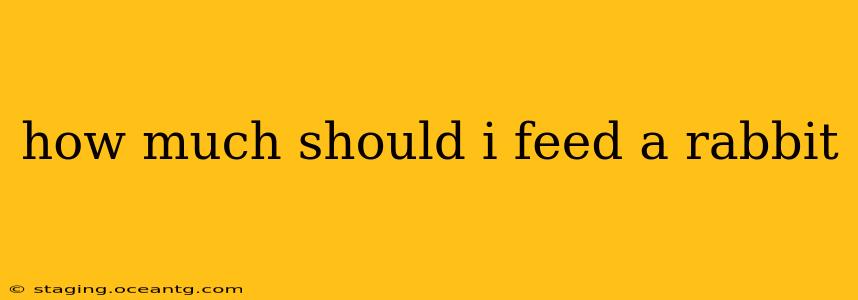Determining the correct amount of food for your rabbit is crucial for their health and well-being. Overfeeding can lead to obesity and related health problems, while underfeeding can result in malnutrition and weakness. This guide will help you understand the nuances of rabbit nutrition and ensure your furry friend receives the perfect portion.
What Factors Influence a Rabbit's Food Intake?
Several factors influence how much food your rabbit needs. These include:
- Breed: Larger breeds generally require more food than smaller breeds.
- Age: Young, growing rabbits need more food than adult rabbits. Senior rabbits may have slightly reduced appetites.
- Activity Level: A more active rabbit will burn more calories and require more food than a less active one.
- Health Status: Rabbits with underlying health conditions may have altered dietary needs. Consult your veterinarian for guidance in these situations.
- Type of Food: The caloric density of the food significantly impacts the amount you should feed. Hay is low in calories, while pellets are more concentrated.
The Basics of Rabbit Nutrition: Hay, Pellets, and Treats
Rabbit diets should primarily consist of unlimited access to high-quality grass hay. This forms the foundation of their diet, providing essential fiber for digestive health. Pellets should be offered in limited quantities, supplementing the hay, not replacing it. Treats should be given sparingly.
How Much Hay Should I Feed My Rabbit?
Unlimited hay is the golden rule. Always ensure your rabbit has a constant supply of fresh, clean hay. Different types of hay offer varying nutritional profiles, so variety is beneficial. Timothy hay is often recommended for adult rabbits due to its lower calcium content.
How Many Pellets Should I Feed My Rabbit?
The amount of pellets depends on your rabbit's size, age, and activity level. A good starting point is around ¼ cup of pellets per 5 pounds of body weight, divided into two feedings per day. Always check the recommended feeding guidelines on your specific pellet brand's packaging. As your rabbit ages, you may need to decrease the pellet amount.
How Many Treats Should I Feed My Rabbit?
Treats should be minimal, accounting for no more than 5% of their daily caloric intake. Fresh vegetables like parsley, carrots, and leafy greens can be given in moderation. Avoid sugary treats and processed foods.
How to Tell if Your Rabbit is Getting the Right Amount of Food
Observe your rabbit's body condition. You should be able to feel their ribs easily, but they shouldn't be prominent. A healthy rabbit has a slight waistline when viewed from above. If your rabbit is overweight, you'll need to reduce their food intake, particularly pellets and treats. If they're underweight, you may need to increase their food intake under veterinary supervision.
What if My Rabbit is Overweight or Underweight?
Overweight Rabbit: Consult your veterinarian. They can help you develop a weight loss plan that involves adjusting the amount of pellets and treats, increasing exercise, and possibly switching to a lower-calorie hay.
Underweight Rabbit: Again, consult your veterinarian. They can rule out underlying medical conditions and recommend a plan to increase your rabbit's food intake and caloric density gradually.
What Type of Hay is Best for My Rabbit?
Various hays offer different nutritional profiles. Timothy hay is a popular choice for adult rabbits due to its lower calcium content, which helps prevent urinary tract issues. Other suitable options include orchard grass and oat hay. Alfalfa hay is higher in calcium and is generally more appropriate for young, growing rabbits.
Can I Give My Rabbit Fruits and Vegetables?
Fruits and vegetables can be given as occasional treats in small quantities. However, they should not replace hay or pellets. Introduce new vegetables gradually to monitor for any digestive upset. Some safe options include carrots, parsley, and bell peppers (in moderation). Avoid foods high in sugar or starch.
Remember, consulting your veterinarian is always recommended to determine the ideal diet for your individual rabbit based on their unique needs and characteristics. They can offer personalized advice and address any concerns you may have. Providing your rabbit with a balanced diet will contribute significantly to their overall health and happiness.
